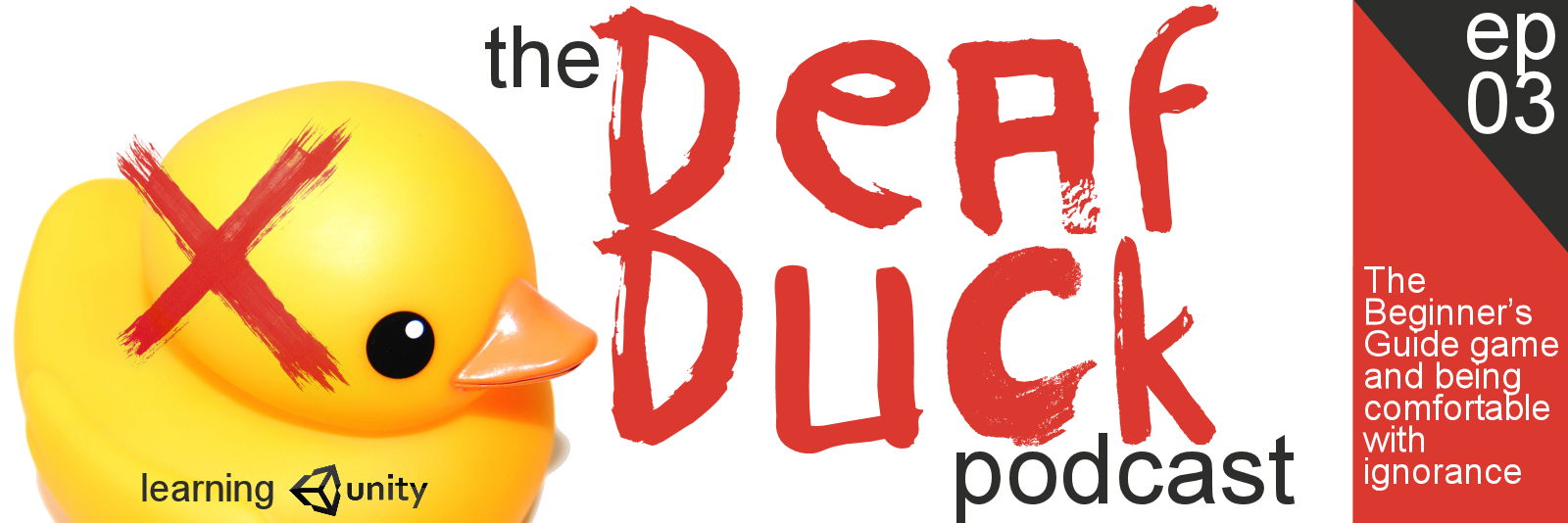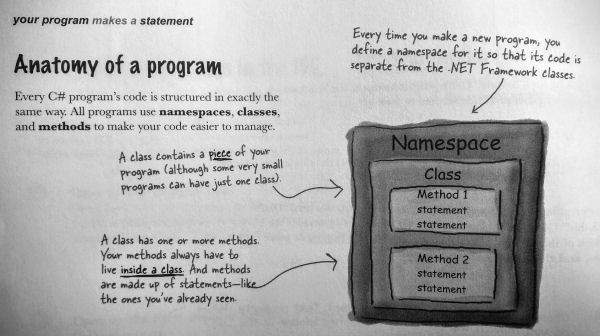The Beginner’s Guide game and being comfortable with ignorance – The Deaf Duck Podcast EP03

In this week’s episode I dig a bit into the game The Beginner’s Guide. While The Deaf Duck is not a game review podcast, The Beginner’s Guide touches on an aspect of creation (any creation really, but in this case video games) that’s often discussed but rarely (that I know of) with the video game medium: Can a person have a satisfying creative life without having objectives for his art? In other words, can one create simply for creation’s sake?
Be a deary and share this podcast with friends who, probably like you, are new to C# and Unity. You can subscribe via RSS or iTunes.
And now for the show notes part of this blog:
Mentioned Resources
- Learn To Code by Making Games – The Complete Unity Developer by Ben Tristem and Brice Fernandes
- Microsoft Virtual Academy.com C# Fundamentals for Absolute Beginners by Robert Tabor
- My first console application math game code (view the code or download the game)
- Head First C#
- The Beginner’s Guide game
- Screenshot from Head First C# which shows the nested hierarchy of Namespace > Class > Method > Statement:



I also have a tendency to need to know the background and context of everything in order to move on. On one hand it’s a blessing because it means I really delve deep into concepts. On the other hand, I can easily get lost in the weeds chasing a concept down a rabbit hole trying to see how it fits into the big picture even though it may not be critical to understanding the picture right in front of me.
So that’s one way that being a beginner in a large universe of unknowns is difficult. It’s hard to know when to let go and move on versus when it’s important to stay with the difficulty and work through it. With the Udemy course it does help that you’re working towards very specific goals, so I often either stop and go over the same lesson multiple times slowly to get what they’re trying to show me, or I move on and resolve to come back later after I have seen a nit more of where they are going with it.
Sometimes a concept that didn’t stick initially reappears later and, even if it’s mentioned quickly the second time, the nature of that particular example may help me understand it better. Right now I’m working on the Pong clone, Block Breaker, and there’s been a couple of lessons I will definitely be reviewing again after the game is done. In fact, I plan on finishing up the game and then going back and trying to recreate it on my own, which of course, I won’t be able to do, but that will show me where all my knowledge gaps lie.
On the not-unrelated topic of motivation, it is tough sometimes, when you’re not getting something and then begin asking yourself why you’re doing this in the first place! I’m not even sure I want to make video games.
There are a few indie games that I really like: Limbo, Journey, and Monument Valley. But I am not sure I even like video games enough to really pursue this as more than a hobby. However, I really like the idea of learning to code, which is a valuable skill, combined with the visual nature and creative requirements of video games. So, I suppose, spending time doing this provides an escape valve from my non-creative endeavors.
But that is why I think a lot about how not to burn out my enthusiasm with too many technical digressions and I’m trying to keep a balance between understanding things somewhat deeply with the desire to have fun and spend more time doing fun things within the learning process.
One insight I gained is that Unity, as one online tutorial put it, can really be looked at as two separate tools, depending on the user and their interests. One is as a visual tool, used to create terrains and animate characters, where pre-existing scripts are used to accomplish as much as possible and the focus is on becoming awesome at modeling and building a world (and despite its apparent limitations – some say it is not as complete as the Unreal Engine, for example- it seems that Unity is capable of a LOT in terms of the world-building capabilities and even becoming really good at that would already be quite a feat). The other way to look at it is as a control center for making things happen with assets built somewhere else and focusing on really deeply understanding the coding side. The latter is not as interesting to me and because I did not want to just use a bunch of scripts that I didn’t understand I decided to do the Udemy course, which tries, I think, to straddle both the coding and world-building perspectives of the program, and which is definitely the most worthy goal if one is serious ant learning this stuff.
I guess I bring this up because I have to remind myself sometimes that, my goal is not primarily to learn coding, it is to model things and build worlds, and know enough about code to allow others to inhabit those worlds. That is why I am taking the Blender course in tandem with this one, so I can give my brain a break from code, think in a more artistic way, and exercise different brain muscles, as well as just have fun.
In fact, before the Udemy course I was doing a YouTube tutorial that focused on using the terrain tool in Unity and just building a world, without getting into scripting and I was having a ton of fun. It was only the desire to understand the ‘black box’ of coding that led me to the Udemy course. And I’m glad I did, and I’m going to continue with it, as I think it’s a great education. I’m just saying, given the enormity of the knowledge I do not yet have, I have to make sure that what I am learning,and the mental and emotional energy I am expending is leading me to my ultimate aim, which is building a world for others to experience (3D, 2D world, doesn’t matter).
And, to relate to something else you said about motivation to write. I think it’s great when people do creative things for no purpose other than to do them. But if the passion behind your creativity has to do with communicating with someone and touching them through your medium, then it is completely normal and expected that you would want to have feedback and want to know they experienced your creation. I think that’s what I want, and so yeah, I might give up if I wasn’t able to reach people. Just a side note, since some people feel like if you give up doing so,etching because you’re not reaching people then it means you were never that into it… Not that giving up is a laudable goal in general, but you can cut yourself slack if you want to reassess why you’re doing what you’re doing and whether it’s what you really want…My two cents, anyway…
Yes, exactly! I make a practice of watching the videos in full before even opening Unity, forcing myself to watch the entire lesson so that I won’t be distracted by my own progress. Knowing exactly where the project is headed helps me understand why we’re doing certain things. For Number Wizard GUI for example had some text buttons called Win and Lose that ultimately were replaced. At first I wondered if I was missing something, but it turns out they were just placeholders. But even that concern, that pang of doubt, was enough to make me later realized that I did know something. Knowing something is wrong is still knowing something.
This happened with me and my fiction writing. After 10 years of writing I realized that I had spent so much time trying to articulate nuances that I forget about the pure joy of storytelling. By that time, I was burnt out. With coding though, I honestly have fun with those nuances. I hope that fun stays with me.
I recently came to this realization too. I was reading a blog post about what new game devs (look at me, using the devs abbreviation) should know. One item was simply, know what a game engine is. I thought I knew, but the post dove into exactly what you say. It helped me understand how game engines are almost like “skins” in that they overlay the code. They help peice the code together in a visual way. But they aren’t they code.
Strange. I’m the opposite. Despite me having an art background, the coding is interesting to me. Though, I am also enrolled in the Blender course (I haven’t started it yet) so it’s possible I may defect and really take to the asset creation side of things.
This is a fantastic perspective to have. Totally makes sense. Thank you for this.
Hey, quick note to say I checked out the Bob Tabor course on C# Fundamentals and you’re right, it’s really good. It already cleared up a few doubts I had and I think it will be a great foundational base.
Cheers!
Glad you like it!